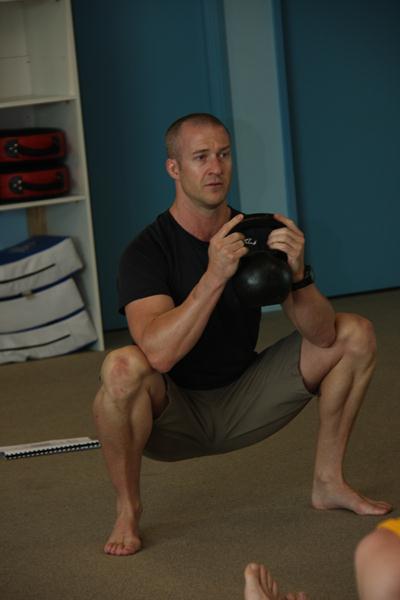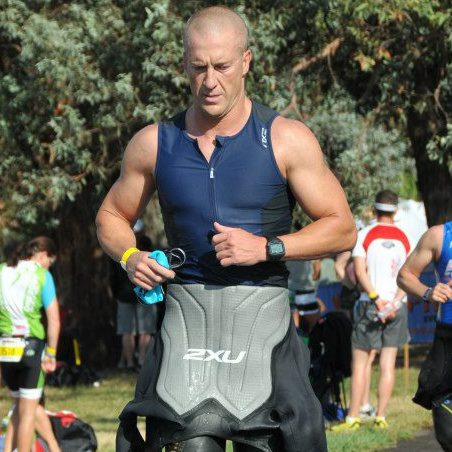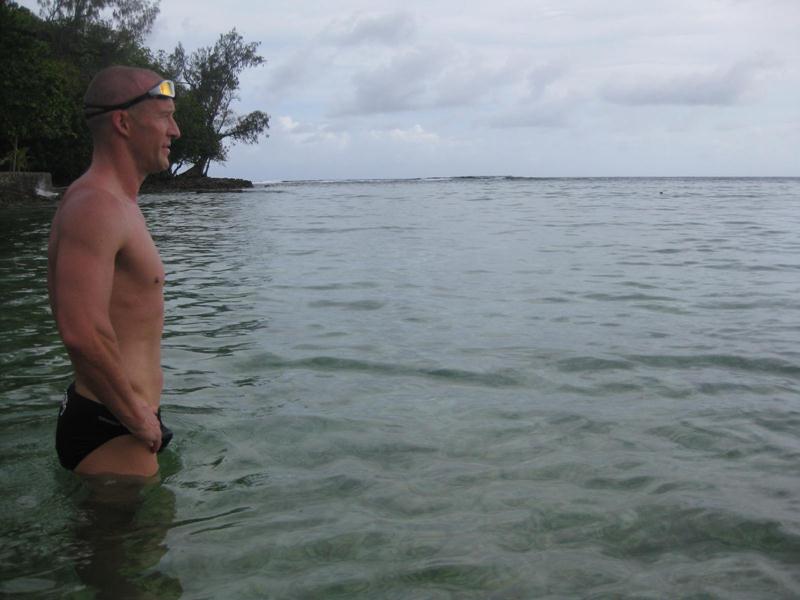Dragon Door Interviews Senior RKC Andrew Read, Dragon Door Australia
Interview by Adrienne Harvey, RKC II, CK-FMS, Primal Move Nat'l Instructor
February 6, 2013 11:27 AM
Dragon Door: How did you first discover kettlebells in Australia?
Andrew Read: I had some shoulder problems and was trying all kinds of things to avoid surgery. I looked at many training methods like unstable training, TRX, push up variations, and eventually learned a little about about kettlebells. About six months later, I finally found someone in Norbin selling them. I bought a 16kg and 24kg, along with Enter the Kettlebell and Steve Cotter’s Encyclopedia of Kettlebell Lifting.
At first I just practiced cleans, presses, and get ups. Even though I wasn't able to avoid surgery, I was able to fix a lot of the pain in my shoulders. Since I wanted to learn more about kettlebells, after my surgery in October of 2007, I attended the RKC Workshop in June of 2009.
Dragon Door: When we spoke before, it sounded like you've always been very involved with athletics and martial arts, too.
Andrew Read: I was a hyperactive and undisciplined child, so my parents—my mum in particular—thought martial arts would be good for me. I started Tae Kwan Do at age nine and continued until age 18. I was a runner at the Olympic Selection Trials in 1988 for Olympics in Seoul, when Tae Kwan Do was a demo sport.
At university, I got into Thai boxing and a little bit of Kung Fu (Wing Chun). Living overseas after university, I started playing volleyball along with swimming and practicing three martial arts. When I came back, I continued to practice Kung Fu, Aikido, more boxing, and a lot of Brazilian jujutsu up until about 2007. I can't remember a time when I wasn't practicing martial arts on at least two or three days a week for about 27 years.
Then in 2000, during Brazilian jujutsu training, I tore my hamstring off the bone. At that point, I promised myself if I ever needed another surgery, I would stop competing in the martial arts. When I had the shoulder surgery in 2007, I decided to stop at that point. Fortunately, that was also around the same time I discovered kettlebells.
Dragon Door: How did you decide to become a Dragon Door distributor?
Andrew Read: On the very first night at the RKC Meet & Greet, I made sure to introduce myself to John Du Cane. By the first break on the first day of the RKC Workshop, I’d already asked Pavel about bringing the RKC to Australia—he told me that I needed to concentrate on my training! But, by Saturday night at the group dinner, I found myself sitting down to talk business while having dinner with John.
By the time I came home, we were already talking about distributing in Australia, though it took a while to get started. My first wholesale shipment of kettlebells arrived on December 24, 2009. It was about 40 degrees Celsius (104F) and the truck arrived during peak hour traffic. At the time, my location didn't have a loading bay. The truck parked down the street, then we had to roll pallets of kettlebells head on into peak hour traffic. After that ordeal, we still had to carry them upstairs. It was a painful Christmas Eve! Now everything’s much better and we practically have a warehouse setup. I had to learn a lot along the way!
Dragon Door: Australia just had its first RKC workshop, how did it go?
Andrew Read: We ran our first HKC in March of 2010, and have run three a year since. But, this year we had two HKC workshops and one RKC. Even though Australia is a large land mass, we only have about 22 million people, this means our our fitness industry is only about 25,000 people. It’s our goal to eventually work up to 200 RKC or HKC instructors in Australia—and we’re about halfway there. Dragon Door Australia is planning to offer RKC and RKC Level 2 workshops next year, along with the Marketing Mastermind Intensive Workshop. I think many Australians need this kind of business and marketing information to make the most of their certifications. John Du Cane's Marketing Mastermind Intensive Workshop is fantastic. I think his information and approach is very important for people who want to really stand out in the fitness industry.

Dragon Door: And you also train group classes and individuals, how does that fit in with Dragon Door Australia?
Andrew Read: Dragon Door Australia is the side of our business that handles workshops and the distribution of books, DVDs, and kettlebells. Our personal training brand is Read Performance Training (and the new website www.readpt.com will be up soon). I'm halfway through developing a program based on it for the USA too! The program will be somewhat tied in with my writing.
Dragon Door: Speaking of your writing, what are some of your current projects?
Andrew Read: Right now, most of my writing consists of articles and a training journal for Breaking Muscle. Recently I had the idea to write up my adventures while training for an Ironman Triathlon, a sort of ‘Zero to Ironman Triathlon in 12 Months’ project. My editor loved the idea, and now I have to actually train to do an Ironman Triathlon! In the fitness industry, it's very easy to fool ourselves into thinking we’re in shape. If we really want to be as healthy and fit as we say we are, we should be out doing as many activities as possible. Everyday I'm now learning what I should and shouldn’t be doing, how hard I can push, how to eat right, all that kind of stuff. This weekend was my first Half-Ironman. It's actually a warm-up, for the Ironman in March. At the same time with RKC, I think instructors should be able to do all the things they ask of the RKC candidates. I prepared for the first Australian RKC as if I was a candidate by practicing all the basic skills, and preparing for the testing.
This year has been fantastic in terms of business, personal adventures, and continuing to learn about training. I think that’s really important with the way Dragon Door is now. The instructors are still out there doing it, they're fit and move well.
Dragon Door: Earlier you mentioned some specific plans now that you’ve been promoted to Senior RKC, what can you tell us?
Andrew Read: I think Dragon Door is really ahead of the curve here in Australia. You can see that kettlebells are on the crest of the wave with the whole-body focus on strength, and that’s fantastic. Now we've been bringing in CK-FMS and taking a holistic approach to training. For us, it’s about making sure we’re still giving our customers in Australia the best possible information.
I've aligned with the Australian Weightlifting Federation, and will be running barbell and dumbbell courses called Integrated Strength Coaching. This approach will allow us to teach the lifts, along with teaching how they can fit together in a program. The coaching system works through different levels ending up with Olympic lifts.
Dragon Door: You're also a Primal Move Instructor, how have the workshops been received in Australia?
Andrew Read: Really well. We had Primal Move Instructor Certification Workshops in Melbourne, Brisbane, and then one in Korea. It was incredible, honestly. It was also a really good learning experience to see the difference in how we educate people here in Australia compared to elsewhere in the world.
The next thing I want to figure out is how to get Primal Move programs into schools here in Australia. PE stops being fun sometime after about grade six. Before that time, you get to know your classmates, run around, and play all sorts of games. Then, in your teens all the sudden that approach stops and becomes much more focused on sports instead of games. For many students, this takes a lot of fun away from PE. When I was in school, I remember some kids would deliberately forget their PE clothes, or even fake a sickness or whatever so they wouldn't have to participate. It never made sense to me, but PE certainly could’ve been a lot more engaging and fun.

Dragon Door: What kind of benefits have you experienced by training with Primal Move?
Andrew Read: When I run Primal Move workshops, it’s always on a Sunday. Then Monday is usually my swim and run day. It’s really odd, but something about crawling around on the ground makes me swim and run substantially better the next day. I feel better in the water—I swim faster, and I run smoother. It’s hard to measure, but the feeling is so much better that it's pretty clear to me that Primal Move really works.
When I talk to some of the other people we’ve been training with it they report a similar result. One guy had some trouble going to RKC Level Two a while ago, and after practicing a lot of Primal Move, he was able to achieve the required lifts. He’d had some terrible shoulder and elbow problems, which turned out to be core-driven, so Primal Move really sorted it out. He’s almost 40, and now he’s actually stronger than he was two years ago, plus he moves better. Seeing results like that happen from Primal Move is very interesting.
One of the things I am now noticing is that the ten elements of Primal Move—and the way that sessions are designed—are really in line with how I've been practicing my strength training for the Ironman. I find that it's quite therapeutic for my shoulders along with some light kettlebell snatching, which seems to reverse the movement of swimming. From there I go through all the core work and mobility work using Primal Move and my strength training on that given day. What I found out was that if I am moving properly before my strength training, then the actual amount of strength work I need to do is much less than what people might expect.
Primal Move also allows me to feel human again after riding a bike for 100 kilometers while crouched on the handlebars. It’s very difficult to describe, but I feel like I've kind of rubbed a hole in one part of myself. My neck and back hurt, and everything seems to stiffen up. But Primal Move makes everything work properly again, so it’s pretty cool stuff. Most of us have been beaten up by a lifetime of athletic pursuits, so when I began to see some good changes happen quickly, it caught my attention. Even if we can't really describe or nail down the specifics, if something like this works, we keep doing it!

Senior RKC Andrew Read,
Dragon Door Australia
Read Performance Training:
Andrew Read also writes regularly for:
Back